Ipsos Bundle
How Does Ipsos Dominate the Market Research Landscape?
In today's data-saturated world, understanding the sales and marketing strategies of industry leaders like Ipsos is crucial. Ipsos, a global powerhouse in market research, consistently delivers "True Understanding" to its clients, allowing them to make informed decisions. This commitment has solidified its position at the forefront of the industry, but how?
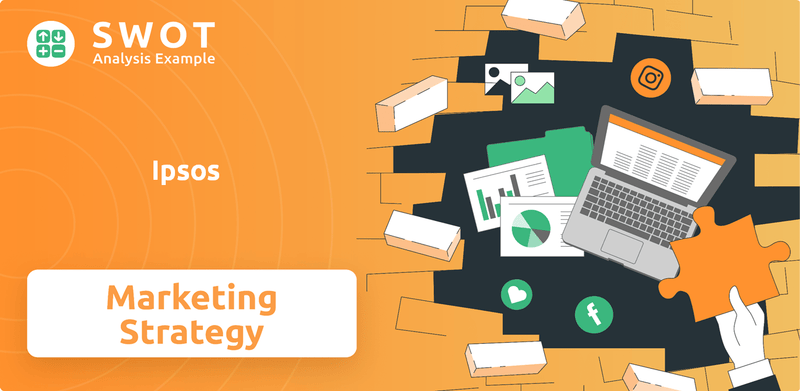
From its origins in Paris to its current global presence, Ipsos has continually adapted its Ipsos SWOT Analysis to stay ahead of the curve. This exploration delves into the Ipsos sales strategy and Ipsos marketing strategy, examining how the Ipsos company strategy fuels its growth. We'll analyze its market research Ipsos methodologies, Ipsos competitive analysis, and Ipsos business model to understand its enduring success, including recent campaigns and its digital marketing approach.
How Does Ipsos Reach Its Customers?
The primary sales channel for Ipsos is a direct sales model, which relies on its team of research professionals and consultants. This approach is essential for its business-to-business (B2B) operations, allowing for tailored solutions and strong client relationships. The company's sales teams are organized globally, and regional performance varies.
The Europe, Middle East, and Africa (EMEA) region saw a total growth of 6.1% in Q1 2025, partly due to acquisitions like Infas in Germany. In contrast, the Americas experienced a 1.7% organic decline, particularly in public affairs work in the US due to political uncertainties. This highlights the impact of regional dynamics on the overall Ipsos sales strategy.
Ipsos's sales channels have evolved, with a strategic shift towards digital adoption and omnichannel integration. This is evident in the growth of its DIY platform, Ipsos.Digital, which saw a 30% increase in revenues in 2024. This platform allows clients to access research capabilities directly, streamlining processes and improving accessibility. While direct sales teams remain central, the digital platform complements this by offering a scalable solution for various client needs. For more information on the company's target audience, consider reading about the Target Market of Ipsos.
Ipsos also engages in strategic partnerships and acquisitions to expand its market reach and capabilities. These moves are crucial for its market research Ipsos and overall Ipsos company strategy. In 2024, the company invested €35 million in acquisitions.
- I&O in the Netherlands.
- Jarmany in the UK.
- Crownit in India.
- These acquisitions reinforce its leadership in public affairs and data analytics.
Ipsos SWOT Analysis
- Complete SWOT Breakdown
- Fully Customizable
- Editable in Excel & Word
- Professional Formatting
- Investor-Ready Format
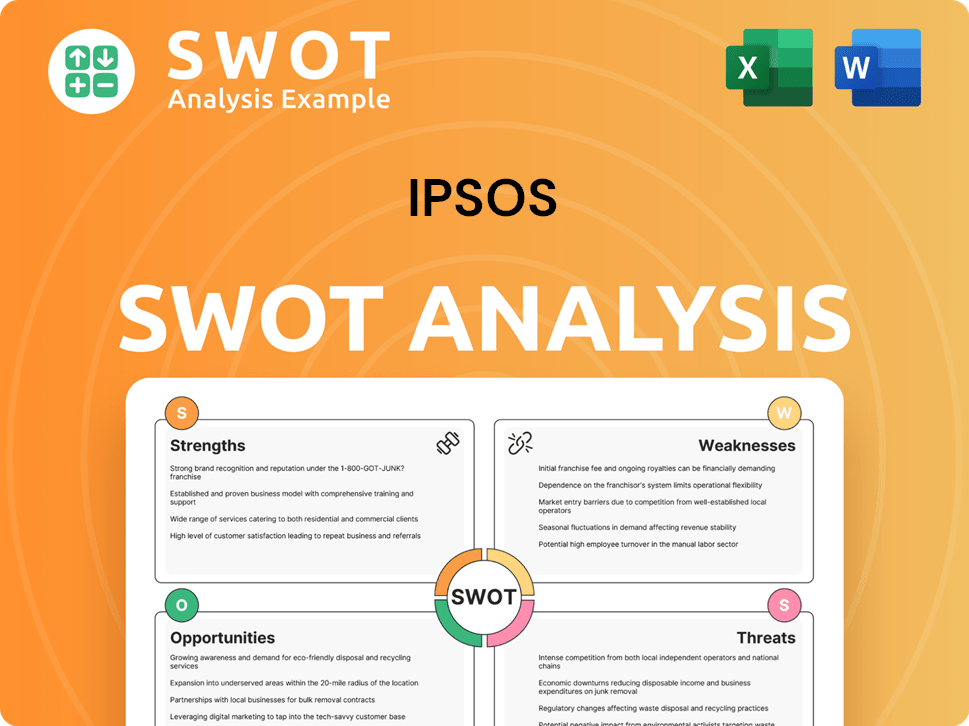
What Marketing Tactics Does Ipsos Use?
The marketing tactics employed by Ipsos are multifaceted, combining digital and traditional approaches to enhance brand awareness, generate leads, and boost sales. Their strategy is heavily data-driven, focusing on customer segmentation and personalization to maximize the impact of marketing efforts. This approach is supported by substantial investments in technology and analytics.
Ipsos leverages its expertise through content marketing, regularly publishing insightful reports such as 'The State of Digital Marketing in India 2024-25' and the 'Ipsos Almanac 2025.' These resources establish the company as a thought leader and attract potential clients. Digital marketing is a cornerstone of their strategy, with social media playing a crucial role, accounting for a significant portion of digital ad spending.
While adapting to the evolving media landscape, Ipsos also recognizes the continued relevance of traditional media, particularly for mass marketing campaigns. This balanced approach, combined with a strong emphasis on data analytics and AI, allows Ipsos to create highly targeted and effective marketing campaigns. The company's commitment to innovation is evident in its use of advanced technologies like its Generative AI platform, Ipsos Facto, which was used regularly by a large percentage of its employees as of late 2024.
Digital marketing is a key component of Ipsos's strategy. Social media platforms are core pillars, contributing a significant share of digital ad spending. This focus allows for targeted campaigns and effective lead generation.
Ipsos uses content marketing to showcase its expertise. Reports like 'The State of Digital Marketing in India 2024-25' and 'Ipsos Almanac 2025' serve as valuable resources. These publications attract clients seeking data-driven insights.
Generative AI plays a significant role in customer segmentation. Ipsos uses AI-powered tools for customized campaigns. The Ipsos Facto platform is used by a large percentage of employees.
Ipsos recognizes the value of traditional media. Traditional media is still relevant for mass marketing efforts. This approach ensures a broad reach.
Ipsos's marketing is heavily data-driven. Customer segmentation and personalization are key. This approach maximizes campaign effectiveness.
Digital marketing surpassed television in India in FY24. Digital now holds the largest media segment share. This shift reflects changing consumer behavior.
Ipsos's marketing strategy includes a blend of digital and traditional methods, supported by advanced technologies and data analytics to achieve its Ipsos sales strategy goals. These tactics are designed to enhance market research Ipsos capabilities and strengthen the Ipsos competitive analysis.
- Content Marketing: Publications like 'The State of Digital Marketing in India 2024-25' and the 'Ipsos Almanac 2025' showcase expertise.
- SEO and Paid Advertising: Utilizing SEO and paid advertising to increase discoverability and reach.
- Email Marketing and Influencer Partnerships: Employing these methods to engage and convert leads.
- Social Media Marketing: Social media is a core pillar, with a significant share of digital ad spending.
- Data Analytics and AI: Leveraging AI for customer segmentation and personalization, with tools like Ipsos Facto.
- Traditional Media: Recognizing the continued relevance of traditional media for mass marketing.
- Market Adaptation: Adapting to the shift towards digital media, which now holds the largest market share in India.
Ipsos PESTLE Analysis
- Covers All 6 PESTLE Categories
- No Research Needed – Save Hours of Work
- Built by Experts, Trusted by Consultants
- Instant Download, Ready to Use
- 100% Editable, Fully Customizable
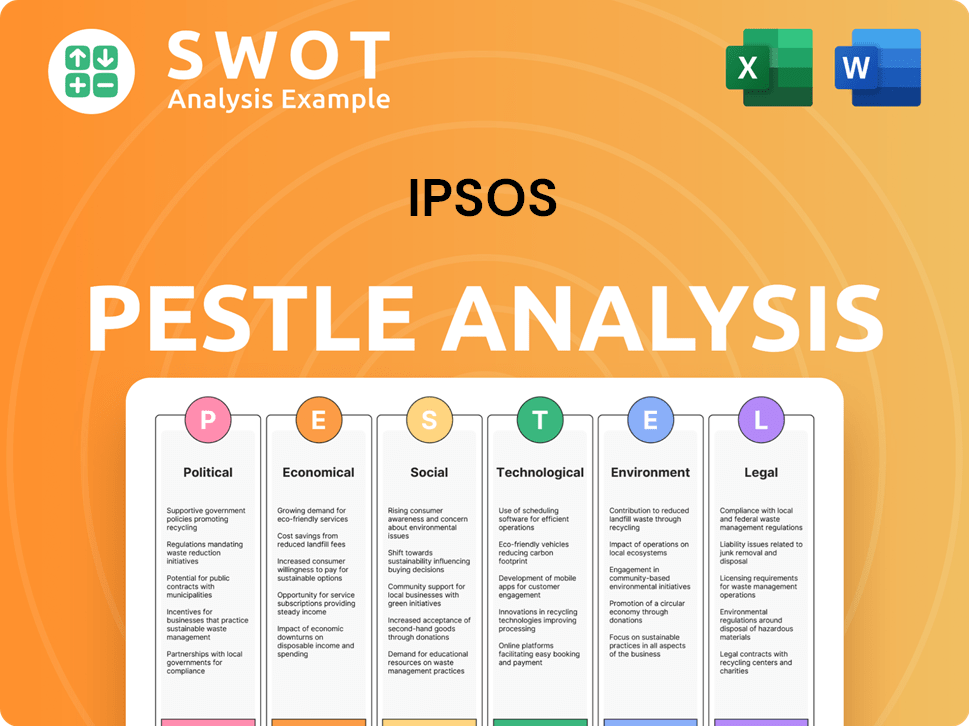
How Is Ipsos Positioned in the Market?
Ipsos strategically positions itself as a global leader in market research and consulting. Its core message centers on delivering 'True Understanding' of markets and people, emphasizing the actionable nature of its insights. This approach aims to resonate with financially-literate decision-makers seeking comprehensive data for informed decisions.
The company's brand identity reflects professionalism and forward-thinking, aligning with its role as a trusted advisor. This is crucial for attracting and retaining clients in the competitive market research industry. Ipsos uses its brand to showcase its expertise in providing strategic frameworks and market analysis.
Ipsos's commitment to maintaining brand consistency across its global operations is key to its success. This consistency is evident in its official reports, online platforms, and client interactions. This unified approach builds trust and reinforces its position as a reliable partner for businesses. For more information, you can also read about Owners & Shareholders of Ipsos.
Ipsos emphasizes 'True Understanding' to highlight the depth and actionable value of its insights. This resonates with clients seeking strategic guidance. This core message underpins its Ipsos sales strategy and Ipsos marketing strategy.
The visual identity and tone of voice reflect professionalism, authority, and a forward-thinking approach. This consistency is crucial for maintaining a strong brand image. This helps in Ipsos's competitive analysis.
Ipsos targets financially-literate decision-makers, offering comprehensive data and strategic frameworks. This focus allows it to tailor its services effectively. This is a key part of Ipsos's business model.
Brand consistency is maintained across global operations, including reports and online platforms. This ensures a unified brand experience. This reinforces Ipsos company strategy.
Ipsos actively monitors consumer sentiment and competitive threats to adapt its offerings. For example, the 'Ipsos Almanac 2025' and 'Ipsos Predictions 2025 Report' demonstrate this proactive approach. Its financial health, with good profitability and cash flow generation in 2024, and Investment Grade ratings from Moody's and Fitch, reinforces its credibility. In 2024, Ipsos reported a revenue of approximately €2.2 billion, demonstrating its strong market position. The company's proactive engagement with trends, including AI and societal anxieties, is a key aspect of its Ipsos marketing campaigns examples.
Ipsos employs a variety of market research methodologies to provide comprehensive insights. These include both quantitative and qualitative research approaches. This is crucial for understanding how Ipsos conducts market research.
Ipsos uses data analytics to extract meaningful insights from large datasets. This helps in identifying trends and patterns. This supports how does Ipsos use data analytics.
Ipsos focuses on building strong client relationships through personalized service and support. This fosters long-term partnerships. This is part of Ipsos's approach to client relationships.
Ipsos implements a global marketing strategy to reach diverse markets and client segments. This involves adapting its messaging and offerings to local needs. This is a key element of Ipsos's global marketing strategy.
Ipsos's competitive advantages include its global presence, expertise, and strong brand reputation. These factors allow it to compete effectively. This supports Ipsos's competitive advantages.
Ipsos uses a pricing strategy that reflects the value of its services and the complexity of its projects. This ensures profitability. This is part of Ipsos's pricing strategy for market research.
Ipsos Business Model Canvas
- Complete 9-Block Business Model Canvas
- Effortlessly Communicate Your Business Strategy
- Investor-Ready BMC Format
- 100% Editable and Customizable
- Clear and Structured Layout
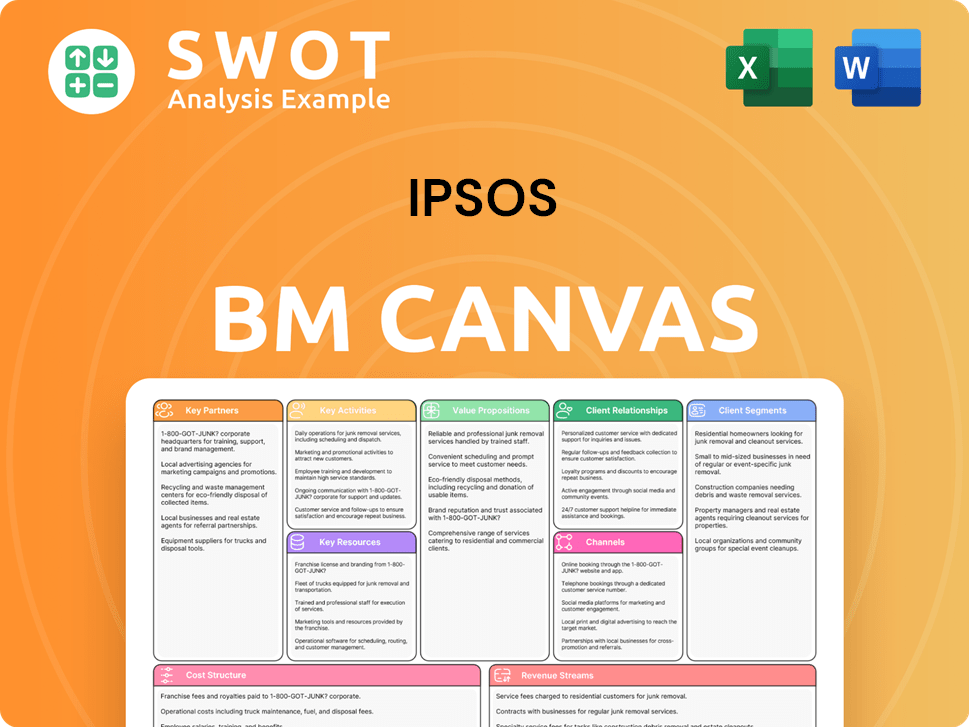
What Are Ipsos’s Most Notable Campaigns?
The 'campaigns' of a market research firm like Ipsos are often centered around significant research initiatives and thought leadership, designed to shape industry understanding and reinforce its brand. These campaigns are crucial components of the Ipsos sales strategy and Ipsos marketing strategy, helping to establish the company as a leading authority in market research. These initiatives are strategically designed to showcase Ipsos's expertise and predictive capabilities, generating media coverage and solidifying its position in the market. This approach is a key element of the overall Ipsos company strategy.
One of the most prominent examples is the annual 'Ipsos Predictions' report. This report is a global survey offering insights into expectations for the coming year across various topics. The aim is to demonstrate Ipsos's ability to forecast trends and gauge global sentiment, thereby attracting media attention and positioning the company as a go-to source for future insights. This campaign is a prime example of how Market research Ipsos leverages its research capabilities for strategic marketing.
Another critical area of focus for Ipsos is the continuous development and promotion of its Generative AI capabilities, such as the Ipsos Facto platform. This reflects an internal and external campaign to highlight innovation and the use of cutting-edge technology. This focus on AI is also reflected in its marketing materials, emphasizing how AI-driven tools are transforming market research and helping clients with data-driven decision-making. These campaigns are integral to the Ipsos business model, enhancing service offerings and maintaining a competitive edge.
The 'Ipsos Predictions' reports are a cornerstone of Ipsos's marketing efforts. For instance, the 'Ipsos Predictions 2025' report, which surveyed 33 countries, revealed that while 71% of respondents were optimistic about personal improvements in 2025, economic concerns persisted. This report is a prime example of Ipsos marketing campaigns examples, demonstrating the company's ability to provide forward-looking insights.
Ipsos actively promotes its Generative AI capabilities, like the Ipsos Facto platform, to showcase its commitment to innovation. As of October 2024, a significant 70% of Ipsos employees regularly used Ipsos Facto. This internal adoption reflects a successful campaign, emphasizing the value of AI in transforming market research. This is crucial for Ipsos's digital marketing strategy.
The success of Ipsos's campaigns is measured not only by internal adoption rates, such as the use of Ipsos Facto, but also by client satisfaction. The demand for Ipsos's data analytics capabilities continues to grow, as demonstrated by the acquisitions made in 2024. These metrics are essential for Ipsos sales performance analysis.
Ipsos focuses on building strong client relationships through these campaigns. By offering valuable insights and innovative solutions, Ipsos aims to enhance client satisfaction and foster long-term partnerships. This approach is a key aspect of Ipsos's approach to client relationships and its overall growth strategy. For more details, see Growth Strategy of Ipsos.
Ipsos Porter's Five Forces Analysis
- Covers All 5 Competitive Forces in Detail
- Structured for Consultants, Students, and Founders
- 100% Editable in Microsoft Word & Excel
- Instant Digital Download – Use Immediately
- Compatible with Mac & PC – Fully Unlocked
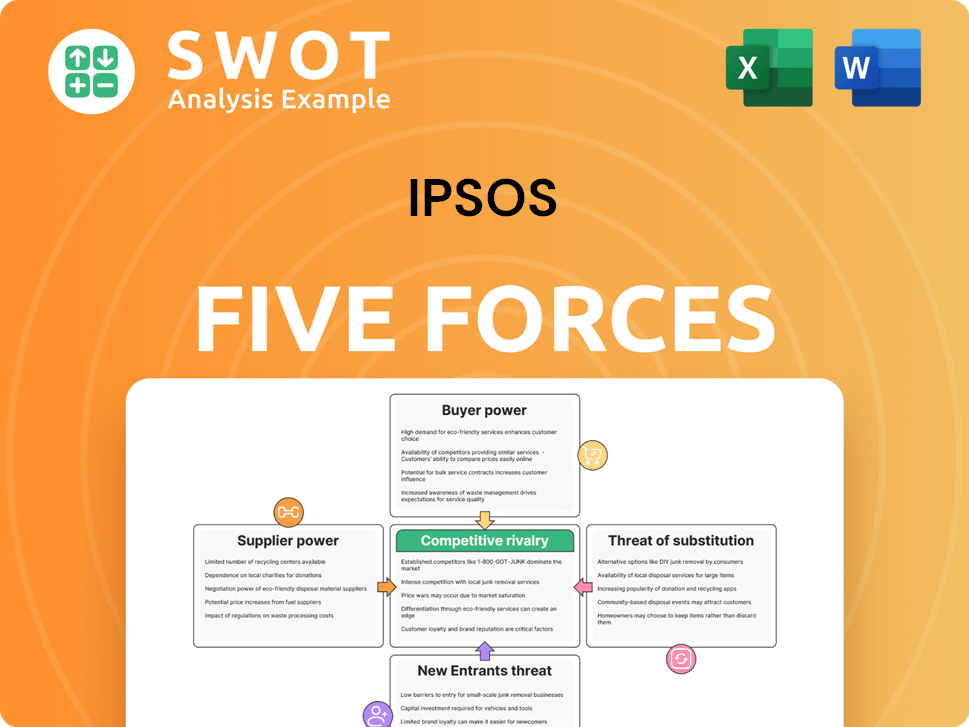
Related Blogs
- What are Mission Vision & Core Values of Ipsos Company?
- What is Competitive Landscape of Ipsos Company?
- What is Growth Strategy and Future Prospects of Ipsos Company?
- How Does Ipsos Company Work?
- What is Brief History of Ipsos Company?
- Who Owns Ipsos Company?
- What is Customer Demographics and Target Market of Ipsos Company?
Disclaimer
All information, articles, and product details provided on this website are for general informational and educational purposes only. We do not claim any ownership over, nor do we intend to infringe upon, any trademarks, copyrights, logos, brand names, or other intellectual property mentioned or depicted on this site. Such intellectual property remains the property of its respective owners, and any references here are made solely for identification or informational purposes, without implying any affiliation, endorsement, or partnership.
We make no representations or warranties, express or implied, regarding the accuracy, completeness, or suitability of any content or products presented. Nothing on this website should be construed as legal, tax, investment, financial, medical, or other professional advice. In addition, no part of this site—including articles or product references—constitutes a solicitation, recommendation, endorsement, advertisement, or offer to buy or sell any securities, franchises, or other financial instruments, particularly in jurisdictions where such activity would be unlawful.
All content is of a general nature and may not address the specific circumstances of any individual or entity. It is not a substitute for professional advice or services. Any actions you take based on the information provided here are strictly at your own risk. You accept full responsibility for any decisions or outcomes arising from your use of this website and agree to release us from any liability in connection with your use of, or reliance upon, the content or products found herein.